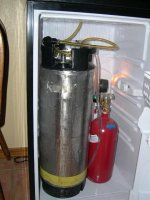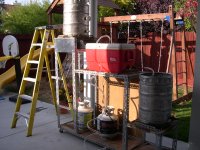Sanitation Sanitation Sanitation.
I have been using Starsan for sanitation. I keep a large Tupperware container full of Starsan mixture and use this to sanitize a measuring cup, thermometers, hydrometers, etc. We keep Starsan in a spray bottle in the kitchen that we use every day to clean counters and range. Using the spray bottle to sanitize large items like fermentation bucket and lid is real handy.
I am doing extract like you because I don't have space to do full grain.
If you have not read John J. Palmer's "How to brew" you need to get the book and start reading. Palmer has far more information than I am likely ever going to need for one of my brews but the book is nice to have on hand when you have a question/problem.
Maintaining temperature both during brewing, cooling the wort to pitch the yeast and when fermenting is critical. Use a good instant read and/or mercury thermometer. I use both to make sure that both thermometers are accurate. I have had nothing but bad luck with the electric thermometers and no longer trust them. I almost messed up a brew using one of these thermometers but I used a mercury thermometer which kept me from overheating the wort. I danged near blew up a tractor tire yesterday when filling it with air because the first air gauge I was using was off by 30-40 PSI! Thankfully, I figured something was wrong and tested the tire with a couple other air gauges before something bad happened. With beer, a bad temperature would just give you bad beer but bad beer be bad. :laughing: I have multiple thermometers, air gauges and multi testers.

To cool the wort, I have been using a water bath in the bath tub, the front porch in cold weather, and an ice machine my wifey got to help with pain after surgery. When using a water bath, I freeze 1 quart bottles of water to keep the water cool. In cool weather, I will fill a plastic storage container on the porch to help cool the wort.
When fermenting I have found I have to brew in late fall, winter, and early spring to keep the temperature down when fermenting. If the temperature is getting to high when fermenting, the five gallon bucket goes into the bathtub to sit in a water bath to help control the heat. I do not transfer the beer from the fermenting bucket to a carboy. I have left the beer in the five gallon bucket for as long as a month before bottling and not had a problem. The beers I have been making are taking about a week to complete fermentation.
I have been using 22oz bottles since it takes fewer bottles to bottle the batch compared to 12 oz bottles. I do use 12 oz bottles to make sure I can bottle as much of the batch as I can. To sanitize the bottles, I use our dishwasher which has a sanitize cycle. When I open a bottle, I make sure I rinse out any yeast and then I let the bottle drain and dry before putting it up.
After I had brewed a few batches, I figured it takes 4-5 hours to brew and 3 hours to bottle. Much of the time with brewing and bottling is getting equipment out, cleaning it before and after brewing, and putting the equipment back up. When brewing I have found that I can brew two batches in about 5 hours and I can bottle in 3 hours. It takes about the same amount of time for me to brew/bottle one batch as it does for two.
Later,
Dan



